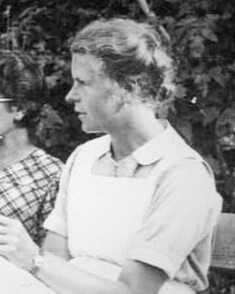Rosli Naf - The Nurse Who Refused to Give Up
Born: May 9, 1911, Glarus, Switzerland
Died: September 15, 1996
Rosli Näf was a Swiss nurse whose courage during World War II saved dozens of Jewish children from Nazi persecution.
Born in Switzerland in 1910, Näf trained as a nurse and worked for the famous German physician Albert Schweitzer before the war. In late 1941, the Swiss Red Cross sent her on a humanitarian mission to France, where she became the leader of a team of teachers and nurses assigned to care for about 100 Jewish children. The children had been hidden in Chateau de la Hille, an old castle south of Toulouse in Vichy-controlled France.
In August 1942, danger struck. French police, following German orders, began rounding up Jews across the country. The 40 eldest children under Näf’s care, teenagers nearing 18, the official deportation age, were seized and sent to a French transit camp. Horrified, Näf refused to stand by. She bicycled to the camp and demanded to see “her children.” Once inside, she harassed the guards and insisted she would not leave until they were released. For nearly a week she pressed her case. At last, the French relented, and the children were freed just hours before being put on trains bound for Auschwitz.
Näf’s bravery did not stop there. In the following months, she and her colleagues helped several groups of teenagers escape across the border into Switzerland. But Swiss authorities, under Nazi pressure, soon passed harsh new rules. In January 1943, a law required refugees aged 16 or older to make it at least ten kilometers into Switzerland before being allowed to stay. Anyone caught earlier was turned back. As many as 30,000 Jews were returned to Nazi-controlled France under this policy.
That same month, five Jewish teens attempted to escape. Among them was 17-year-old Inge Joseph, one of the children under Näf’s care. Caught by German guards, she managed to jump out of a bathroom window and flee toward Switzerland. She walked far enough to see the lights of Geneva when a Swiss gendarme arrested her. Because she had not yet reached the 10-kilometer mark, she was returned to France, just one of tens of thousands of Jews pushed back into danger. Ten months later, with help from Swiss sympathizers, Inge tried again. This time she was escorted through the woods the required distance and finally reached safety.
Näf, however, would not be so fortunate. Her boldness brought complaints from both French and German officials. In early 1943, she was ordered back to Switzerland and dismissed. An internal Swiss Red Cross memo coldly stated: “Unanimously agreed the Swiss Red Cross needs to totally distance itself from the director (Näf).” Though she had saved lives, she was branded a “smuggler” and largely forgotten.
After the war, Näf lived quietly. She never received recognition from Switzerland or the Red Cross. She died in a nursing home at the age of 85, reportedly regretting that she had not tried harder to save more children. But the children she rescued remembered. Survivors wrote books, shared testimonies, and honored her as one of the few who risked everything for them. Israel named her Righteous Among the Nations, its highest honor for non-Jews who saved Jewish lives during the Holocaust.
Only decades later did her homeland begin to face its past. In 2014, Christians in the Vallée de Joux region of Switzerland launched a campaign to honor Näf and her colleagues. Led by journalist Joel Reymond, the group raised funds for a memorial in the lakeside town of Le Pont, near the border where so much “smuggling” had taken place. Hundreds attended the unveiling, including the last surviving “smuggler,” then 90-year-old Bernard Bouveret. For many, the commemoration was a kind of catharsis, a chance to face the uncomfortable truth that Switzerland, while officially neutral, often turned away refugees in their hour of need.
Rosli Näf’s story is one of both extraordinary bravery and painful injustice. Though abandoned by her own country, she chose conscience over obedience, and children who might have perished lived because of her. She remains a symbol of the difference one determined person can make, even in the darkest of times.
References:
Debyemm. “Roslï Näf.” Missing Mom, 16 Apr. 2022, missingmom.home.blog/2022/04/16/rosli-naf/.
Gumpert, David E. “Switzerland Begins to Confront Its Own Holocaust Past.” The Forward, 5 Nov. 2014, forward.com/opinion/208252/switzerland-begins-to-confront-its-own-holocaust-p/.
Keywords:
Justice, Wartime, Conscience, Courage, Responsibility, Selflessness, Challenge Injustices, Take Risks for Others
Image Citation:
"Parera Naef La Hille 1941 SRK 414.jpg" by Archive Swiss Red Cross licensed under CC BY-SA 3.0 / Cropped from original
Explore ARTEFFECT projects about this Unsung Hero:
Rosli Naf Artworks
- Collections: Art Gallery, Unsung Heroes

